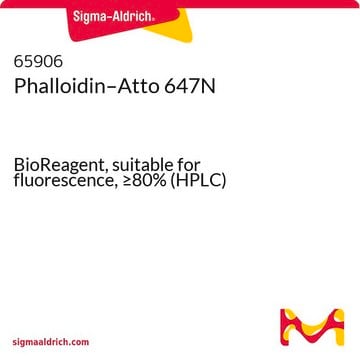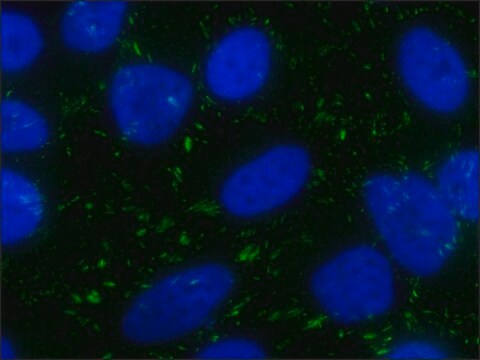FAK100
Actin Cytoskeleton / Focal Adhesion Staining Kit
The Actin Cytoskeleton & Focal Adhesion Staining Kit consists of TRITC-conjugated phalloidin, anti-Vinculin & DAPI for the immunofluorescent staining of actin filaments in the cytoskeleton as well as the nucleus of the cells.
동의어(들):
Actin Staining Kit
로그인조직 및 계약 가격 보기
모든 사진(2)
About This Item
UNSPSC 코드:
12352207
eCl@ss:
32161000
NACRES:
NA.32
추천 제품
생물학적 소스
mouse
Quality Level
종 반응성
bovine, pig, human, rabbit
제조업체/상표
Chemicon®
기술
immunocytochemistry: suitable
배송 상태
wet ice
일반 설명
The Actin Cytoskeleton and Focal Adhesion Staining Kit consists of three components (TRITC-conjugated phalloidin, anti-Vinculin and DAPI) for the immunofluorescent staining of actin filaments in the cytoskeleton, focal contacts as well as the nucleus of the cells.
Reagents and materials supplied in the Actin Cytoskeleton and Focal Adhesion Staining Kit are sufficient for 100 tests (including controls).
Introduction
The actin cytoskeleton is a highly dynamic network composed of actin polymers and a large variety of associated proteins. The functions of the actin cytoskeleton is to mediate a variety of essential biological functions in all eukaryotic cells, including intra- and extra-cellular movement and structural support. To perform these functions, the organization of the actin cytoskeleton must be tightly regulated both temporally and spatially. Many proteins associated with the actin cytoskeleton are thus likely targets of signaling pathways controlling actin assembly. Actin cytoskeleton assembly is regulated at multiple levels, including the organization of actin monomers (G-protein) into actin polymers and the superorganization of actin polymers into a filamentous network (F-actin - the major constituent of microfilaments) [1]. This superorganization of actin polymers into a filamentous network is mediated by actin side-binding or cross-linking proteins [2, 3, 4]. Actin cytoskeleton is a dynamic structure that rapidly changes shape and organization in reponse to stimuli and cell cycle progression. Therefore, a disruption of its normal regulation may lead to cell transformations, hence cancer. Transformed cells have been shown to contain less F-actin than untransformed cells and exhibit atypical coordination of F-actin levels to the cell cycle [5]. Orientational distribution of actin filaments within a cell is an important determinant of cellular shape and motility. Therefore,
Focal adhesion and adherens junctions are membrane-associated complexes that serve as nucleation sites for actin filaments and as cross-linkers between the cell exterior, plasma membrane and actin cytoskeleton [6]. The function of focal adhesions are structural, linking the ECM on the outside to the actin cytoskeleton on the inside. They are also sites of signal transduction, initiating of signaling pathways in response to adhesion. Focal adhesions consist of integrin-type receptors that are attached to the extracellular matrix and are intracellularly associated with protein complexes containing vinculin (universal focal adhesion marker), talin, a-actinin, paxillin, tensin, zyxin and focal adhesion kinase (FAK) [7,8].
CHEMICON′s Actin Cytoskeleton and Focal Adhesion Staining Kit (Catalog number FAK100) is a very sensitive immunocytochemical tool that contains fluorescent-labeled phalloidin (TRITC-conjugated phalloidin) to map the local orientation of actin filaments within cell and a mouse monoclonal antibody to Vinculin that is very specific for the staining of focal contacts in cells.
Reagents and materials supplied in the Actin Cytoskeleton and Focal Adhesion Staining Kit are sufficient for 100 tests (including controls).
Introduction
The actin cytoskeleton is a highly dynamic network composed of actin polymers and a large variety of associated proteins. The functions of the actin cytoskeleton is to mediate a variety of essential biological functions in all eukaryotic cells, including intra- and extra-cellular movement and structural support. To perform these functions, the organization of the actin cytoskeleton must be tightly regulated both temporally and spatially. Many proteins associated with the actin cytoskeleton are thus likely targets of signaling pathways controlling actin assembly. Actin cytoskeleton assembly is regulated at multiple levels, including the organization of actin monomers (G-protein) into actin polymers and the superorganization of actin polymers into a filamentous network (F-actin - the major constituent of microfilaments) [1]. This superorganization of actin polymers into a filamentous network is mediated by actin side-binding or cross-linking proteins [2, 3, 4]. Actin cytoskeleton is a dynamic structure that rapidly changes shape and organization in reponse to stimuli and cell cycle progression. Therefore, a disruption of its normal regulation may lead to cell transformations, hence cancer. Transformed cells have been shown to contain less F-actin than untransformed cells and exhibit atypical coordination of F-actin levels to the cell cycle [5]. Orientational distribution of actin filaments within a cell is an important determinant of cellular shape and motility. Therefore,
Focal adhesion and adherens junctions are membrane-associated complexes that serve as nucleation sites for actin filaments and as cross-linkers between the cell exterior, plasma membrane and actin cytoskeleton [6]. The function of focal adhesions are structural, linking the ECM on the outside to the actin cytoskeleton on the inside. They are also sites of signal transduction, initiating of signaling pathways in response to adhesion. Focal adhesions consist of integrin-type receptors that are attached to the extracellular matrix and are intracellularly associated with protein complexes containing vinculin (universal focal adhesion marker), talin, a-actinin, paxillin, tensin, zyxin and focal adhesion kinase (FAK) [7,8].
CHEMICON′s Actin Cytoskeleton and Focal Adhesion Staining Kit (Catalog number FAK100) is a very sensitive immunocytochemical tool that contains fluorescent-labeled phalloidin (TRITC-conjugated phalloidin) to map the local orientation of actin filaments within cell and a mouse monoclonal antibody to Vinculin that is very specific for the staining of focal contacts in cells.
애플리케이션
Research Category
Cell Structure
Cell Structure
Research Sub Category
Cytoskeleton
Cytoskeleton
성분
Vinculin Monoclonal antibody, purified clone 7F9 (Part No. 90227). One vial containing 100 μL at 1 mg/mL.
TRITC-conjugated Phalloidin (Part No. 90228). One vial containing 15 μg.
DAPI (Part No. 90229). One vial containing 100 μL.
TRITC-conjugated Phalloidin (Part No. 90228). One vial containing 15 μg.
DAPI (Part No. 90229). One vial containing 100 μL.
저장 및 안정성
When stored at 2-8º C, the kit components are stable up to the expiration date. Do not freeze or expose to elevated temperatures. Discard any remaining reagents after the expiration date.
법적 정보
CHEMICON is a registered trademark of Merck KGaA, Darmstadt, Germany
면책조항
Unless otherwise stated in our catalog or other company documentation accompanying the product(s), our products are intended for research use only and are not to be used for any other purpose, which includes but is not limited to, unauthorized commercial uses, in vitro diagnostic uses, ex vivo or in vivo therapeutic uses or any type of consumption or application to humans or animals.
신호어
Danger
유해 및 위험 성명서
Hazard Classifications
Acute Tox. 3 Dermal - Acute Tox. 3 Inhalation - Acute Tox. 3 Oral - Flam. Liq. 2 - STOT SE 1
표적 기관
Eyes,Central nervous system
Storage Class Code
3 - Flammable liquids
시험 성적서(COA)
제품의 로트/배치 번호를 입력하여 시험 성적서(COA)을 검색하십시오. 로트 및 배치 번호는 제품 라벨에 있는 ‘로트’ 또는 ‘배치’라는 용어 뒤에서 찾을 수 있습니다.
이미 열람한 고객
Cell culture and motility study on a polymer surface with a nanometer-scaled stripe structure.
Sakamoto Y, Sato K, Abo M, Tsukahara T, Kitamori T, Abe K, Yoshimura E
Bioscience, Biotechnology, and Biochemistry null
High intracellular iron oxide nanoparticle concentrations affect cellular cytoskeleton and focal adhesion kinase-mediated signaling.
Soenen SJ, Nuytten N, De Meyer SF, De Smedt SC, De Cuyper M
Small null
Design of a novel fibronectin-mimetic peptide-amphiphile for functionalized biomaterials.
Mardilovich, Anastasia, et al.
Langmuir, 22, 3259-3264 (2006)
Patterning discrete stem cell culture environments via localized self-assembled monolayer replacement.
JT Koepsel, WL Murphy
Langmuir null
Mitochondria-targeted peptide MTP-131 alleviates mitochondrial dysfunction and oxidative damage in human trabecular meshwork cells.
Min Chen,Bingqian Liu,Qianying Gao,Yehong Zhuo,Jian Ge
Investigative Ophthalmology & Visual Science null
자사의 과학자팀은 생명 과학, 재료 과학, 화학 합성, 크로마토그래피, 분석 및 기타 많은 영역을 포함한 모든 과학 분야에 경험이 있습니다..
고객지원팀으로 연락바랍니다.















